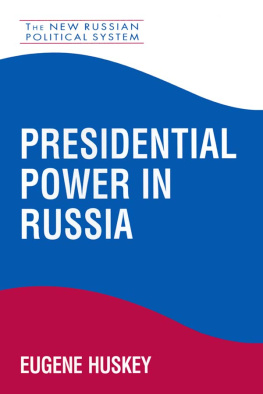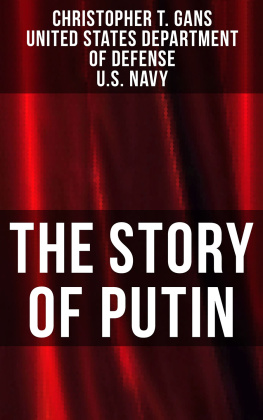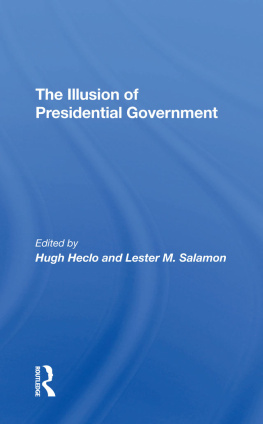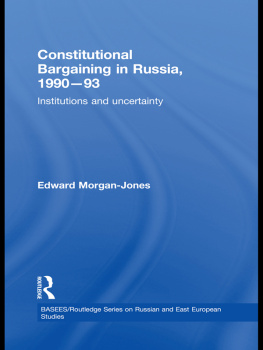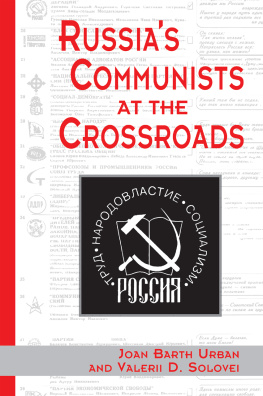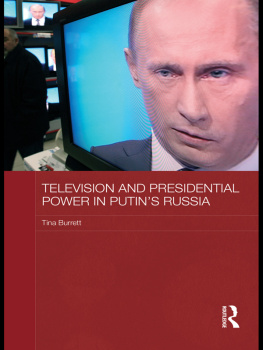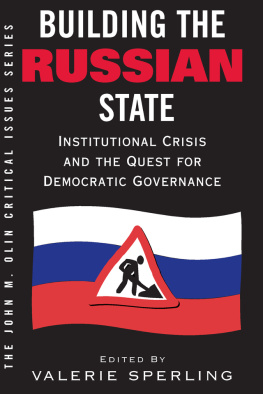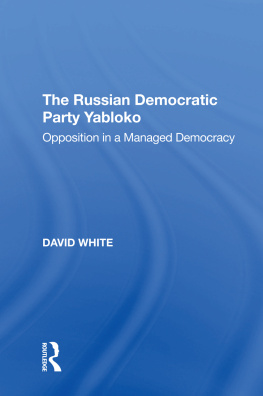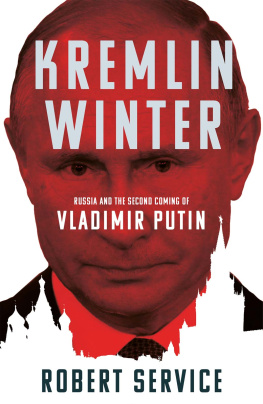PRESIDENTIAL POWER IN RUSSIA
THE NEW RUSSIAN
POLITICAL SYSTEM
Series Editor:
Robert Sharlet
Presidential Power in Russia is the first in a series of books examining the evolution of the main political institutions of post-Soviet Russia. Forthcoming volumes will be devoted to legislative politics, courts and the judicial system, constitutionalism, federalism and regional politics.
THE NEW RUSSIAN
POLITICAL SYSTEM
PRESIDENTIAL POWER IN RUSSIA
EUGENE HUSKEY
First published 1999 by M.E. Sharpe
Published 2015 by Routledge
2 Park Square, Milton Park, Abingdon, Oxon OX14 4RN
711 Third Avenue, New York, NY 10017, USA
Routledge is an imprint of the Taylor & Francis Group, an informa business
Copyright 1999 Taylor & Francis. All rights reserved.
No part of this book may be reprinted or reproduced or utilised in any form or by any electronic, mechanical, or other means, now known or hereafter invented, including photocopying and recording, or in any information storage or retrieval system, without permission in writing from the publishers.
Notices
No responsibility is assumed by the publisher for any injury and/or damage to persons or property as a matter of products liability, negligence or otherwise, or from any use of operation of any methods, products, instructions or ideas contained in the material herein.
Practitioners and researchers must always rely on their own experience and knowledge in evaluating and using any information, methods, compounds, or experiments described herein. In using such information or methods they should be mindful of their own safety and the safety of others, including parties for whom they have a professional responsibility.
Product or corporate names may be trademarks or registered trademarks, and are used only for identification and explanation without intent to infringe.
Library of Congress Cataloging-in-Publication Data
Presidential power in Russia / by Eugene Huskey.
p. cm.(The New Russian political system)
Includes bibliographical references (p. ) and index.
ISBN 1-56324-536-1 (cloth : alk. paper). ISBN 1-56324-537-X (pbk. : alk. paper)
1. PresidentsRussia (Federation). 2. Executive powerRussia (Federation). 3. Russia (Federation)Politics and government1991 . 4. Yeltsin, Boris Nikolayevich, 1931
I. Title. II. Series.
JN6696.H87 1999
352.230947dc21 99-20508
CIP
ISBN 13: 9781563245374 (pbk)
ISBN 13: 9781563245367 (hbk)
To Janet
Contents
This is a book written on, and in, a period of transition. While Russia was changing dramatically in the 1990s, so were the sources available to study it. During the course of the decade, the familiar touch and smell of Russian books and newsprint began to give way to purely visual images on a computer screen. Sitting in a small Florida town thousands of miles from Russia, one could read the transcripts of press conferences conducted only a short time earlier in the Kremlin. This technological revolution may increase a researchers sense of independence, but it does not diminish his debts to the many individuals and institutions that serve as partners in the intellectual enterprise.
Despite the rise of electronic research, librarians remain indispensable search engines for all of us. For their generous help, I would like to thank librarians at the Institute of State and Law and the Russian State Library in Moscow, the Library of Congress, and the duPont-Ball Library of Stetson University. The National Council for Eurasian and East European Research (NCEEER) funded travel and a respite from teaching in the first half of 1995, which allowed me to begin research for the book in earnest. I am especially grateful for the support and counsel of NCEEERs former president, Vlad Toumanoff. Stetson University provided me a sabbatical leave in the second half of 1995, and its Russian Studies Program facilitated contacts with Russian and Western specialists in the field, whether through travel grants to Russia or through a regular speakers series here in Florida. I also wish to acknowledge the assistance of the International Research and Exchanges Board (IREX), which funded a three-week research trip to Moscow and Riazan, and the Kennan Institute for Advanced Russian Studies, which hosted me for a month in Washington, DC.
No matter how well Westerners know Moscow, they remain dependent at times on their Russian friends and colleagues for assistance. Igor Filippov, Mark Slavin, Liudmila Diachenko, and Mikhail Guboglo were delightful companions as well as resourceful tolchaki (fixers in the positive sense of the word). I am also grateful to the many Russian scholars and officials who agreed to be interviewed for this book, including two survivors of the presidency and the academy, Valerii Savitskii and Aleksandr M. Yakovlev. With the emergence in Russia of a freer press and more stimulating academic publications, Western research is increasingly indebted to Russian journalism and scholarship for information and analysis. This project is no exception. Especially helpful to me was the work of two correspondents whose beats included the Russian presidency, Denis Babichenko, of Segodnia, and Irina Savvateeva, of Izvestia. They were among several journalists who graciously agreed to reverse roles and sit for interviews.
In this country, Ed Kline, perhaps the only person to move from retailing to Russian studies, was an early and astute reader of the manuscript and a constant source of encouragement. Tim Colton, Gary Maris, and Pat Willerton also read the manuscript in its entirety and offered valuable suggestions for revision. Todd Foglesong, Tom Remington, Mike Urban, George Breslauer, Archie Brown, Sergei Porshakov, Peter Reddaway, Darrell Slider, and Peter Solomon read one or more chapters and enriched the book with their expertise and commentary. I am indebted to Bruce Bradford for producing the maps of Moscow, to Stephanie Friese for research assistance at the inception of the project, and to Susan Bradford for always making work in the Russian Studies Center a little easier for me. I am grateful also to students at Stetson who tried out the beta version of this book and to audiences at the Kennan Institute, the State Department, Emory University, Kansas University, and the University of Wisconsin for their reactions to my ideas about the Russian presidency. To Patricia Kolb, my editor at M.E. Sharpe, and Bob Sharlet, the general editor of the series, The New Russian Political System, my thanks for using patience and prodding at just the right moments.
Finally, a word of appreciation to my family, who have lived with this book longer than they care to remember. They tolerated my absence, whether it was for weeks in Russia and Central Asia or for hours in our computer room. They also provided their own distinct forms of supportSarah and Charlotte, my daughters, by regularly asking me when the book was going to be finished, and Janet Martinez, my wife, by helping me to meet deadlines when she had so many of her own. It is to Janet that the book is dedicated.
PRESIDENTIAL POWER IN RUSSIA
1
Introduction
In the spring of 1991, a concert in the Great Hall of the Moscow Conservatory honored the late physicist and human rights activist Andrei Sakharov. The event brought to the stage eminent Russian musicians who rarely performed in Moscow: Mstislav Rostropovich, Sviatoslav Richter, and Vladimir Spivakov. Among the many dignitaries in the audience were Mikhail Gorbachev, perched to the side of the stage in the tsars box, and Boris Yeltsin, sitting in the stalls. Despite Gorbachevs rank as Soviet president and his visibility in the loge, it was the insurgent politician, Boris Yeltsin, who attracted the attention of the crowd that evening. During the intermission, while Gorbachev and his wife, Raisa, retreated to the privacy of an anteroom, Boris Yeltsin strode back to the public entrance hall, where he greeted a pressing throng of well-wishers. It was only three weeks before Russias first democratic presidential elections, and candidate Yeltsin radiated an energy, charm, and resolve that would see him through to victory in June and to defeat of a right-wing coup attempt in August. With the collapse of the USSRand Gorbachevs humiliating abdication of the Soviet presidencyin December 1991, Boris Yeltsin took the final step in his journey from rebel to ruler, joining the long line of princes, tsars, and general secretaries who have governed Russia.

